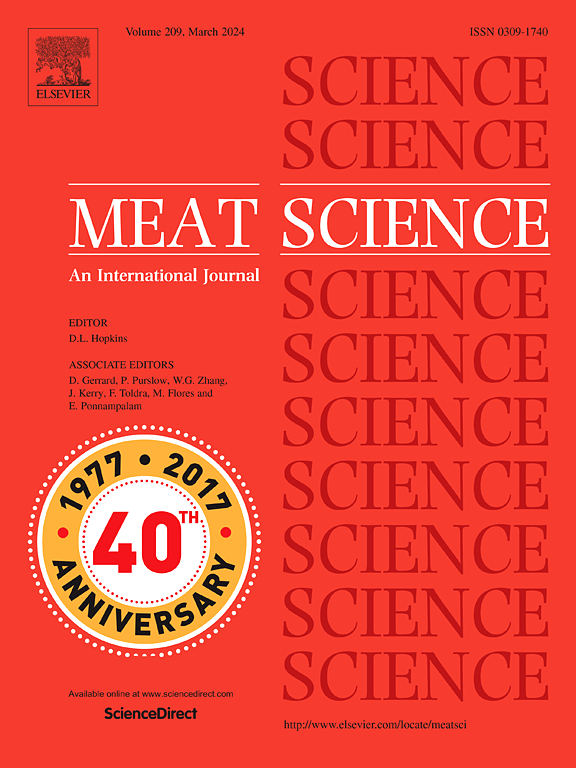发现在猪肉品质发展过程中蛋白质乳酸化的潜在参与
IF 6.1
1区 农林科学
Q1 Agricultural and Biological Sciences
引用次数: 0
摘要
乳酸作为一种糖酵解代谢物,与鲜肉品质的发展密切相关,但其在死后生化调节中的意义却鲜有进展。我们去年的研究首次在家畜肉类科学中发现,乳酸衍生的蛋白质赖氨酸乳酸化可能发生在死后肌肉中。下一步,目前的工作旨在提供基于免疫组织荧光修饰特异性蛋白质组学分析的肌肉到肉转化过程中蛋白质乳酸化的进一步概述。结果表明,与死后1小时相比,死后24小时对乳酸积累有反应的蛋白质乳酸化水平明显更高,而E1A结合蛋白p300 (p300)的水平没有显著变化,p300被认为是一种乳酸转移酶。同时,p300和乳酸化蛋白广泛分布于死后肌细胞的细胞核、细胞膜和细胞质中,尤其在死后24 h细胞质分布明显增强。更重要的是,揭示了能量代谢和肌肉收缩是肌肉转化过程中由乳酸化修饰介导的两个最关键的生化途径。这些新发现有望为揭示和控制肉类质量发展的基于乳酸的死后生化理论做出贡献,特别是那些具有典型高乳酸水平的质量缺陷猪肉和家禽。本文章由计算机程序翻译,如有差异,请以英文原文为准。
Discovery of potential involvement of protein lactylation during the development of pork quality
Lactate, as a glycolytic metabolite, is well known to be strongly associated with the development of fresh meat quality, yet little progress has been made regarding its significance in postmortem biochemical regulation. Our research last year identified for the first time in livestock meat science that lactate-derived protein lysine lactylation could occur in postmortem muscle. Propulsively, the current work aimed to provide a further overview of protein lactylation during muscle to meat conversion based on immunohistofluorescence with modification-specific proteomics profiling. Results demonstrated that, compared with 1 h postmortem, protein lactylation levels at 24 h postmortem responsive to lactate accumulation were notably higher, while no significant change was noted for the level of E1A binding protein p300 (p300), identified as a lactyltransferase. Meanwhile, p300 and lactylated proteins were broadly localized in the nucleus, cell membrane, and cytoplasm of postmortem myocytes, especially presenting a remarkable enhancement of the cytoplasmic distribution at 24 h postmortem. More importantly, it was disclosed that energy metabolism and muscle contraction were the two most critical biochemical pathways mediated by lactylation modification during muscle to meat conversion. These emerging findings hold promise to contribute to a lactate-based postmortem biochemical theory for unraveling and controlling the development of meat quality, especially those quality-defective pork and poultry with typically high lactate levels.
求助全文
通过发布文献求助,成功后即可免费获取论文全文。
去求助
来源期刊

Meat Science
工程技术-食品科技
CiteScore
12.60
自引率
9.90%
发文量
282
审稿时长
60 days
期刊介绍:
The aim of Meat Science is to serve as a suitable platform for the dissemination of interdisciplinary and international knowledge on all factors influencing the properties of meat. While the journal primarily focuses on the flesh of mammals, contributions related to poultry will be considered if they enhance the overall understanding of the relationship between muscle nature and meat quality post mortem. Additionally, papers on large birds (e.g., emus, ostriches) as well as wild-captured mammals and crocodiles will be welcomed.
 求助内容:
求助内容: 应助结果提醒方式:
应助结果提醒方式:


